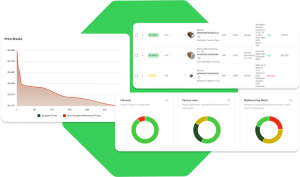Rackspace Puts OpenStack Where Its Mouth Is With New Cloud Services
![]() As we gear up for this week’s OpenStack Conference, Rackspace is betting its business on the OpenStack project with today’s announcement that the hosting provider is moving its flagship Cloud Servers offering onto a platform powered by the jewel of the open source cloud movement. And it doesn’t stop there: Rackspace is bringing OpenStack to the enterprise with Cloud Networks, Cloud Databases service and – in a move designed to take on Amazon Web Services – the debut of Cloud Block Storage.
As we gear up for this week’s OpenStack Conference, Rackspace is betting its business on the OpenStack project with today’s announcement that the hosting provider is moving its flagship Cloud Servers offering onto a platform powered by the jewel of the open source cloud movement. And it doesn’t stop there: Rackspace is bringing OpenStack to the enterprise with Cloud Networks, Cloud Databases service and – in a move designed to take on Amazon Web Services – the debut of Cloud Block Storage.
These new services are more-or-less self-explanatory. Cloud Servers, Rackspace’s cloud compute service, is now powered by the latest version of Nova, the compute component of the OpenStack platform. Customers can sign up now to be moved over to Nova-based instances, with the transition starting on May 1st. Cloud Databases, now in early access, gives API access to scalable, automated MySQL databases in the cloud, with the actual storage handled on SAN for high performance.
A note of clarification before going any further: “Early access” means that select Rackspace customers are invited to use the fully-supported, SLA-backed offering early, while “beta” means that customers use the service at their own risk.
Cloud Block Storage, currently in beta, is designed specifically to leverage OpenStack to plug a major hole in its offering as the company continues its quest to erode Amazon Web Services’ dominance, Rackspace CTO John Engates confirmed when I spoke to him about this announcement. Customers of Rackspace Cloud Block Storage can choose between more costly, but higher performance SSD storage for their structured data, or cheaper, more standard spinning discs.
And Cloud Networking leverages the OpenStack Quantum technology to manage abstracted network services. Essentially, Engates says, Rackspace Cloud Networking looks to bring network segmentation and VLAN-like functionality into the cloud, but with a strong focus on meeting modern scalability requirements. As an added bonus, this kind of network topology management makes hybrid cloud (by way of Rackspace RackConnect) enablement a relative snap, Engates says.
Outside the realm of OpenStack, Rackspace is also announcing an early access program for Cloud Monitoring (API-driven cloud infrastructure and application management, built on its CloudKick acquisition) and a new, redesigned Cloud Control Panel for server/service management.
But what this announcement really demonstrates, Engates says, is a vote of all confidence in the OpenStack platform and project, and it’s obvious that the timing here is to reinforce confidence in and buzz around the conference, as the community converges here in San Francisco to discuss the project’s future. That’s especially important with the public eye on OpenStack in the wake of Citrix’s defection.
Yes, Rackspace co-founded the OpenStack project, and has a vested interest in the platform’s adoption. But Engates insists that moving Rackspace’s popular Cloud Servers offering to an OpenStack-based platform was driven by technology, not politics. OpenStack is giving Rackspace services a shot in the arm, performance-wise, he says, and it’s enabling the hosting provider to really expand its cloud play in general. In other words, OpenStack has turned a corner, and enterprise adoption is picking up.
“It’s definitely ready,” Engates says.
A message from John Furrier, co-founder of SiliconANGLE:
Your vote of support is important to us and it helps us keep the content FREE.
One click below supports our mission to provide free, deep, and relevant content.
Join our community on YouTube
Join the community that includes more than 15,000 #CubeAlumni experts, including Amazon.com CEO Andy Jassy, Dell Technologies founder and CEO Michael Dell, Intel CEO Pat Gelsinger, and many more luminaries and experts.
THANK YOU









